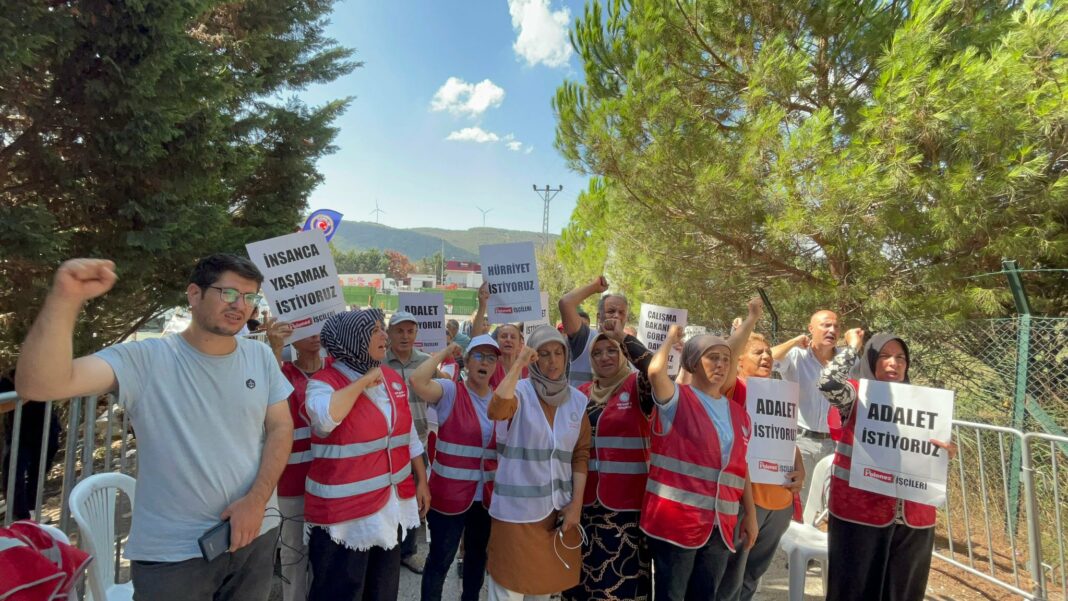A wave of strikes across Turkey has been met with police intervention and allegations of brutality as employees protest layoffs, low wages and poor working conditions.
In İstanbul’s Çatalca district, workers at the Polonez meat products factory have been protesting for 61 days since 146 employees were dismissed for joining the Tek Gıda-İş labor union. The workers allege they were fired without cause and have been staging sit-ins and demonstrations outside the factory gates.
On Monday tensions escalated when approximately 600 police officers surrounded the factory. According to the Tek Gıda-İş union, 80 workers were detained using reverse handcuffs — a method where hands are cuffed behind the back — during a pre-dawn raid. Union representatives, including Tek Gıda-İş Organizing Specialist Yunus Durdu, were among those detained.
“Police attacked us without warning,” said Burhan Kocatepe, a worker with 12 years at the factory. “They dismantled our protest area, tore down our banners and threw us onto the pavement.”
Workers reported injuries from the police intervention. “One of our colleagues suffered two broken ribs and was rushed into emergency surgery,” said Suat Karlıkaya, another union organizing specialist. “Another had a dislocated shoulder, and several were hospitalized due to tear gas exposure.”
The situation at Polonez is part of a broader pattern of labor unrest in Turkey.
In the western province of Manisa, miners at the Fernas Mining Company — a firm linked to ruling Justice and Development Party (AKP) MP Ferhat Nasıroğlu — have been protesting for four weeks. Six miners were allegedly fired for joining the Independent Miners Union. The miners expanded their protest to Ankara, planning to hold a vigil outside the Ministry of Labor and Social Security.
Employees at As Plastik in İstanbul’s Hadımköy district launched a strike after unionizing with Petrol-İş and demanding a 35 percent wage increase. Ten workers, including three union representatives, were fired.
“We were terminated without compensation under codes implying we committed dishonorable acts,” said Savaş Çakmak, a union representative. “The employer views unionization as a disgrace.”
At Akcanlar Textile in the southeastern province of Gaziantep, workers have been protesting for two months against wage reductions and poor working conditions. Mehmet Türkmen, president of the United Textile Knitting and Leather Workers Union, said approximately 90 workers were fired without severance pay after the strike began.
In the İskenderun district of southern Hatay province, workers at Befesa Silvermet have been on strike for nearly two months over low wages. Represented by the United Metalworkers Union, the workers report that the employer has not offered any new proposals. “Our strike will continue until we secure our rights,” said Deniz Ilgan, the union’s Anatolia branch president.
Government and police response
The Turkish government has faced criticism for its handling of the labor disputes. Opposition parties and labor unions accuse the police of acting as enforcers for employers, rather than maintaining neutrality.
Gülistan Kılıç Koçyiğit, deputy group chair for the pro-Kurdish Peoples’ Democracy and Equality Party (DEM Party), condemned the police actions during a press conference at parliament. “Workers are being subjected to violence and threats while exercising their constitutional rights,” she said. “This is a war waged by capital against the working class.”
Koçyiğit emphasized the high number of workplace fatalities in Turkey. “In August alone, 129 workers died on the job. In the first eight months of this year, 1,201 workers lost their lives while working. This is a war toll — the result of hazardous working conditions and lack of safety measures.”
Despite the police interventions, workers across Turkey remain resolute. At Polonez, employees have set up a new protest site outside the Çatalca District Governor’s Office after being barred from the factory premises.
“We will not be intimidated,” said Kadriye Duran, one of the dismissed Polonez workers. “They think they can break our spirit with force, but we are more determined than ever. We will sit in the main road if we have to. We will march to Ankara. We will not give up on our rights.”
Turkey is grappling with economic challenges, including high inflation and a depreciating currency. Workers argue that their wages have not kept pace with the rising cost of living.
